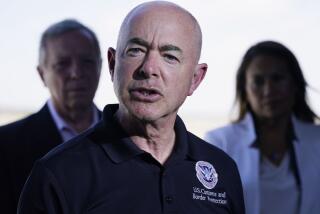From the War on Terrorism, New Jobs
- Share via
President Bush used more than half of his State of the Union address last week to talk about jobs, although you may be excused if you missed it.
The job references were indirect but implicit in his extended discussion of homeland security and the continuing threat from terrorism.
“Our greatest responsibility is the active defense of the American people,” Bush declared in the speech. Later in the week, the president announced that he would try to increase the budget for the Department of Homeland Security, which opened its doors just one year ago this weekend. “My job,” said Bush, “is to secure the homeland, and that’s exactly what we’re going to do.”
Specifically, the White House is seeking to raise the budget for DHS by 10% in fiscal 2005, which begins Oct. 1, to about $40 billion.
So far anyway, the most visible jobs to come out of such spending are the 50,000 DHS employees who screen passengers and baggage at the nation’s airports. These are good jobs with decent pay and government benefits. But they are hardly enough to boost overall employment figures -- an area that the president, given the poor record of job creation during his time in office, was wise to avoid lingering on in his remarks to the nation.
And yet, over time, this promises to change. Just as the Cold War helped propel American industry -- including major sectors such as aerospace and information technology -- so, too, is the War on Terrorism shaping up to be a significant economic force.
What began as an emergency response is becoming a long-term commitment by the White House, as well as society at large. Jobs that all of us hoped might somehow be temporary -- specialists who check for biological, chemical and nuclear radiation -- are becoming part of a new profession.
This reality was underlined last week as Maureen McCarthy, the director of research and development for DHS, officially opened the nation’s first Homeland Security Center at USC.
The mission of the center, financed with a $12-million, three-year government grant, is to assess the threats facing everything from the air we breathe to the water we drink. Its staff also will devise countermeasures -- along with ways to help the civilian population cope in case the countermeasures fail and disaster strikes.
Doing all that, says McCarthy, who has a doctorate in chemical physics, will demand “a lot of cost-benefit analysis and scientific research and innovation.”
Meanwhile, security is becoming an academic discipline, no different from accounting or law or dentistry. Next fall, USC will start awarding a master’s degree in systems security. Last year, the school inaugurated a master’s program in cyber-security -- the protection of computer systems from thieves, terrorists and mere hackers.
About 350 students signed up for the first cyber-security class, confident that at the end of their studies they would find what every graduate hopes for: a good job. Indeed, hundreds of thousands of high-paying positions already exist in the field. And “this number will double or triple in the next five years as information multiplies on the Internet,” notes Gordon Adams, regional manager of Electronic Data Systems Corp.
DHS plans to open six or seven more research centers around the country. And it already has set up a Homeland Security Advanced Research Projects Agency, or HSARPA. This is the civilian version of the Pentagon’s famed DARPA, which over half a century helped fund development of such wonders as the integrated circuit and the Internet.
Until now, McCarthy explains, homeland security has depended on adaptations of equipment and systems designed for the Defense Department. “But our mission is to protect the civilian population, not to kill the enemy,” she says. “We need subtly different approaches.”
Clearly, industry is already attuned to this.
For example, InVision Technologies Inc., of Newark, Calif., made medical-scanning equipment before Sept. 11. But after the terror attacks, it became the leading supplier of the machines that scan luggage at airports. InVision’s revenue shot up to more than $400 million from $74 million in a single year. Its payroll has soared, too, going from about 100 to 1,000.
What’s more, many of the jobs that the company is adding pay very well. Sergio Magistri, InVision’s president and chief executive, points out that the employees he is bringing on have skills in imaging technology, physics and computers -- and often command salaries of $100,000 or more a year.
Increasingly, too, it seems as if his workers can count on long careers. The birth of DHS, the launch of HSARPA, the work being performed at USC -- they all point to the same thing: As Magistri puts it, “It means that security is becoming mainstream.”
*
James Flanigan can be reached at jim.flanigan@ latimes.com. To read previous columns, go to latimes.com/flanigan.
More to Read
Inside the business of entertainment
The Wide Shot brings you news, analysis and insights on everything from streaming wars to production — and what it all means for the future.
You may occasionally receive promotional content from the Los Angeles Times.










